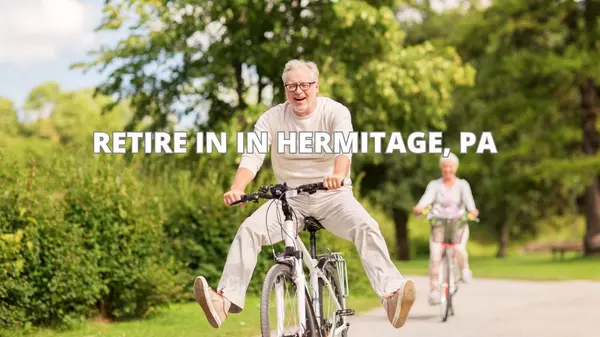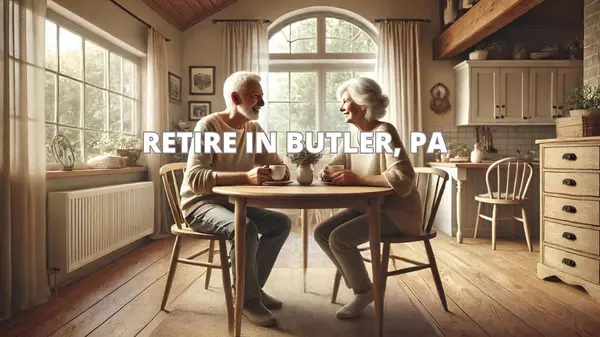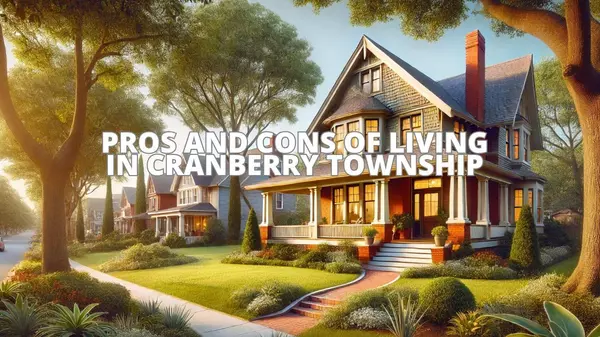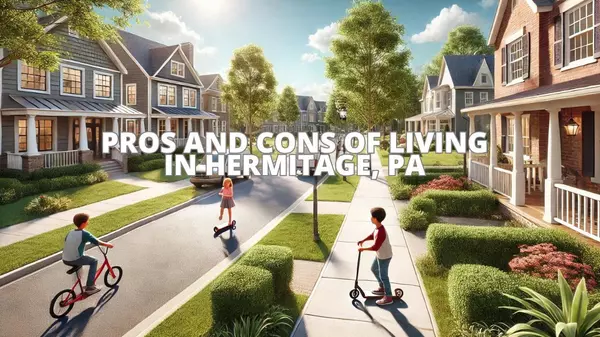Pros and Cons of Living in Butler, PA

Living in Butler, Pennsylvania, offers a unique blend of suburban life and small-town charm. Residents appreciate the city's convenient location and community feel, which can make it an appealing place for families and young professionals alike. However, potential newcomers should weigh both the benefits and challenges of calling Butler home.
Butler provides access to local amenities, parks, and a close-knit community atmosphere. Many families enjoy the area for its schools and recreational opportunities. Yet, the city also faces economic challenges, including a relatively high poverty rate and lower median household income compared to national averages.
As individuals consider moving to Butler, they must look at various aspects like cost of living, quality of life, and job opportunities. This article aims to explore the pros and cons of living in Butler, PA, to help readers make an informed decision about whether this city is the right fit for them.
Geographic Location and Climate
Butler, PA, is situated in the western part of Pennsylvania, known for its scenic landscapes and distinct seasons. Its geographic features and climate significantly influence the lifestyle and activities available to residents.
Topography and Natural Features
Butler is located in a region characterized by rolling hills and valleys. The area is rich in natural beauty, featuring parks and outdoor spaces. Notable natural attractions include McConnells Mill State Park, which offers trails and views of waterfalls and rugged landscapes.
The Allegheny River lies to the east, providing opportunities for fishing and canoeing. Forested areas surround Butler, contributing to its charm and offering plenty of recreational activities for residents. This topography makes it a suitable location for outdoor enthusiasts.
Seasonal Weather Patterns
Butler experiences a humid continental climate, marked by four distinct seasons.
- Winter (December to February) is cold, with temperatures often dropping below freezing and occasional snow.
- Spring (March to May) brings milder weather, with temperatures gradually rising and flowers blooming.
- Summer (June to August) is warm, with average highs in the 80s°F.
- Fall (September to November) offers cool temperatures and vibrant fall foliage.
Rain is common throughout the year, with the highest precipitation occurring in late spring and summer. Residents enjoy diverse seasonal activities ranging from winter sports to summer festivals.
Economic Overview
Butler, Pennsylvania, offers unique economic features that impact residents' daily lives. Employment opportunities and the cost of living play significant roles in the attractiveness of the city.
Employment Opportunities
The job market in Butler is diverse but can be competitive. Key sectors include healthcare, manufacturing, and retail, providing various roles for residents.
The average income for a resident is around $23,846, which is lower than the national average. The unemployment rate tends to align closely with state and national averages, but specific figures may vary over time.
Many residents face challenges finding high-paying jobs due to limited opportunities. As a result, some individuals pursue employment beyond city limits, often commuting to nearby areas.
Cost of Living
The cost of living in Butler is generally lower than the national average, which can be a draw for many families. Housing prices are quite affordable, with median home prices offering significant value.
Utilities and transportation costs also remain manageable.
However, the city does have a poverty rate of 24.2%, which is notably higher than the national average. This statistic suggests that while some residents benefit from lower costs, financial hardship can still be an issue for many.
The combination of affordable living and economic challenges shapes Butler's economic landscape and influences residents' quality of life.
Housing and Real Estate
Housing in Butler, PA, offers a mix of affordability and historical charm. The real estate market has unique trends, and property taxes can influence buyers' decisions.
Real Estate Market Trends
The housing market in Butler is characterized by a range of options for potential homeowners. The median home cost is approximately $207,500, which is a manageable price point for many buyers.
In the last decade, home appreciation has been notable, rising by approximately 59.3%. This indicates a growing interest in the area. As of recent reports, home prices have increased by about 9.2% over the past year.
Many homes in Buttler are older, with the average age around 78 years. This can appeal to buyers looking for historic properties. However, it may also mean maintenance considerations.
The rental market is also significant, with renters making up over 50% of the population. This provides options for those not ready to buy.
Property Taxes
Property taxes in Butler are an essential factor for homeowners and potential buyers. The tax rates tend to be lower than many surrounding areas, helping to make living in Butler more affordable.
Homeowners should be aware that property taxes can vary based on location and property value. This means it is vital to research specific neighborhoods for accurate tax information.
In addition to base property taxes, there may be local assessments for schools and infrastructure. Staying informed about these can help in budgeting for homeownership.
Overall, understanding property taxes and trends in the local real estate market can greatly benefit anyone considering a move to Butler, PA.
Community and Lifestyle
Butler, PA offers a unique mix of local culture, recreational activities, and educational opportunities. This community provides residents with various options for leisure and living that enhance their overall quality of life.
Local Culture and Events
Butler hosts a variety of cultural events throughout the year that bring the community together. The Butler Arts Festival showcases local artists, musicians, and performers, drawing visitors from surrounding areas.
Families enjoy the annual Butler County Fair, highlighting local agriculture, crafts, and entertainment. Seasonal events, like holiday parades, foster a strong sense of community.
Local restaurants and shops reflect Butler’s charm, with many small businesses offering unique products and dining experiences. Farmers' markets also provide fresh produce and handmade goods, creating a vibrant local economy.
Recreational Facilities
Recreation is an essential part of life in Butler. The city features multiple parks, including Bradley Park and North Park, which have walking trails, playgrounds, and picnic areas. These green spaces encourage outdoor activities and family gatherings.
For sports enthusiasts, Butler has facilities for basketball, soccer, and baseball. The YMCA offers fitness programs and swimming options, promoting health and wellness among residents.
In addition, nearby state parks provide opportunities for hiking, fishing, and camping. These resources make it easy for residents to stay active and enjoy time outdoors.
Schools and Education
Education in Butler is supported by several school districts that provide quality learning environments. Butler Area School District offers various educational programs aimed at different learning styles and needs.
For families, the availability of public and private schools means they can choose the best fit for their children. Additionally, local libraries host educational programs and events to foster a love of reading and learning.
Higher education options, like Butler County Community College, provide courses for both young adults and lifelong learners. This commitment to education serves as a foundation for personal and community growth.
Transportation and Accessibility
Transportation in Butler, PA, includes options for public transport and developed road infrastructure. These features play a crucial role in daily commutes and overall mobility for residents.
Public Transport Services
Butler offers limited public transportation options primarily managed by the Butler Transit Authority. The transit system provides local bus services that connect key areas of the city, making it easier for residents to access shopping, schools, and healthcare services.
The main routes operate on fixed schedules, which can sometimes be infrequent, especially during off-peak hours. While public transport is affordable, it may not cover all neighborhoods effectively, leading to some reliance on personal vehicles. For those needing to travel beyond Butler, options like the nearby Amtrak station in Pittsburgh provide additional accessibility.
Road Infrastructure
Butler boasts a well-maintained road network, making driving an efficient way to get around. Major roads, including Route 8 and Route 356, facilitate travel to surrounding areas. The city’s layout supports easy navigation and access to important amenities.
Parking is generally available in commercial areas, although some may experience congestion during peak hours. Residents appreciate the balance between city convenience and suburban feel, as the roads are designed to accommodate both local and through traffic. Overall, the road infrastructure enhances mobility within Butler and connects it to larger regional destinations.
Healthcare Services
Butler, Pennsylvania, offers a range of healthcare services to its residents. The city has a number of medical facilities, including hospitals and clinics. These provide essential services for both routine care and emergencies.
The healthcare provider ratio in Butler is 132 physicians per 100,000 residents. This is lower than the national average of 210 per 100,000 people. Access to healthcare may be a concern for some residents because of this difference.
In Butler, the Health Cost Index is 88.1. This figure means that healthcare costs are generally lower than the national average, which is set at 100. This can be helpful for families looking to manage their budget.
Emergency services are also available, but only 27.4% of the residents live close to these facilities. It is critical for individuals to know the location of their nearest emergency care options.
Residents can find various specialists, but some may need to travel outside Butler for specific healthcare needs. The community stays informed about local health options through online resources.
Overall, while Butler provides essential healthcare services, residents should consider their specific needs and proximity to medical facilities when choosing to live in the area.
Safety and Security
Safety and security are essential factors to consider when living in Butler, PA. Residents are concerned about crime rates and the effectiveness of emergency services in the area.
Crime Rates
Butler experiences a higher crime rate than many other cities. It is in the 19th percentile for safety, indicating that 81% of cities in the country are safer. The average rate of crime is approximately 23.35 incidents per 1,000 residents.
Property crimes, such as burglary and theft, make up a significant portion of reported incidents. Violent crimes, while present, occur less frequently. The local police department works to address these issues through community engagement and crime prevention programs.
Emergency Services
Emergency services in Butler include local police, fire departments, and medical responders. The Butler Police Department is committed to enhancing community safety through various initiatives. They provide quick responses to emergencies and develop programs focused on crime prevention.
Fire and medical services are also readily available, ensuring residents have access to help when needed. Training and drills are regularly conducted to keep emergency responders prepared for various situations. This preparedness contributes to the overall safety of the community.
Pros and Cons Summary
Living in Butler, PA has its benefits and drawbacks. Here is a breakdown of both.
Pros:
-
Affordability: The cost of living in Butler is lower than the national average. Housing costs, in particular, are about 13% less than national rates.
-
Community Feel: Butler has a friendly and welcoming atmosphere. Residents often appreciate the small-town vibe.
-
Access to Nature: The area offers parks and outdoor activities, making it great for nature lovers.
-
Rich History: Butler has a storied past, with historical sites and events that provide cultural insights.
Cons:
-
Limited Job Market: The local job market can be competitive, with fewer opportunities in specialized fields.
-
Population Demographics: The city predominantly has a homogenous population, which may affect cultural diversity.
-
Weather: Winters can be harsh, with significant snowfall, which may not suit everyone’s preferences.
-
Public Transport: Public transportation options are limited, making it necessary for many to rely on personal vehicles.
In summary, Butler offers a mix of affordability and community spirit, along with some limitations in job opportunities and public services.
Frequently Asked Questions
Residents often have specific queries about living in Butler, PA. The following sections address common questions regarding education, cost of living, recreational activities, the job market, healthcare services, and transportation options.
What are the educational facilities like in Butler, PA?
Butler has several educational institutions, including public and private schools. The Butler Area School District serves the city and offers various programs. Local schools often focus on both academic and extracurricular activities to support student development.
How does the cost of living in Butler compare to nearby cities?
The cost of living in Butler is generally lower than in larger cities in Pennsylvania. Housing costs, in particular, tend to be more affordable. However, essential expenses like groceries and transportation may vary depending on the area.
What recreational opportunities are available to residents of Butler?
Butler offers a range of recreational facilities, including parks and community centers. Locals can enjoy outdoor activities such as hiking, and sports, or partake in community events. The area's natural beauty also provides opportunities for exploration and relaxation.
Can you describe the job market in Butler, Pennsylvania?
The job market in Butler includes a mix of industries, with healthcare and manufacturing being prominent sectors. The unemployment rate can fluctuate, but local businesses often seek employees with various skill levels. Networking and local job fairs can help those looking for new opportunities.
How do the healthcare services in Butler, PA rate against other cities?
Butler has several healthcare facilities, including hospitals and clinics. The availability of services can vary, but residents typically have access to essential medical care. Comparing healthcare services with larger cities may reveal differences in specialized care and facilities.
What transportation options are accessible for commuting within and from Butler?
Transportation in Butler includes public transit options, making it easier to commute within the city. Residents also have access to major highways for travel to nearby cities. Biking and walking paths are available in some areas, promoting alternative commuting methods.
Categories
Recent Posts












